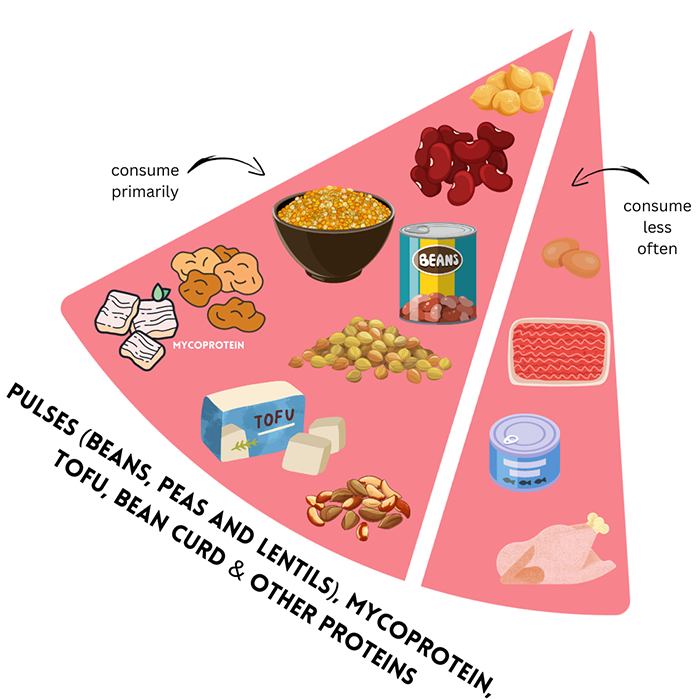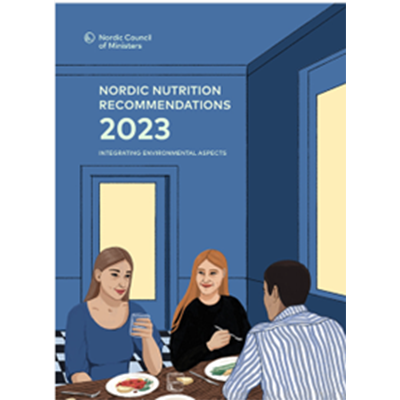Incorporating sustainability in the Eatwell Guide: An opportunity for human and planetary health

What we eat, and the way that food is produced is driving multiple and interrelated crises - to public health, climate and nature.
In England 64% adults are overweight or living with obesity1 while 1 in 7 face hunger2 and the cost of living crisis is exacerbating food insecurity3. Meanwhile, what we eat and the way food is produced is a leading cause of biodiversity loss, deforestation, drought, freshwater pollution and collapse of aquatic wildlife4.
Shifting diets is one of the most amazing opportunities we have to reorientate the food system for better human and planetary health, which makes healthy sustainable diets our new North Star. Many countries are making great strides by joining the dots between health and sustainability in their national dietary guidelines. Now is the time for the UK to follow suit.
Why the Eatwell Guide offers a prime opportunity to shift diets for healthier people and planet
In the UK our national dietary guidelines (the Eatwell Guide) outlines the government’s recommendations for food and nutrients - or healthy eating. The Eatwell Guide is instrumental in framing public health policy and public consciousness. It’s used widely by national and local government, the NHS, health care professionals (including nutritionists and dietitians), industry and the public.
“Used by Registered Nutritionists and Dietitians, Eatwell is a tool for using with groups, in one-to-one consultations and in public health promotion to communicate messages on healthier diets. It incorporates a variety of foods from different groups, to provide macro and micro nutrients in amounts aligned with nutrient recommendations”
Dr Sally Moore Registered Dietitian
The Eatwell Guide, last updated by the UK government in 2016, recommends a diet which delivers energy from carbohydrates, proteins and fats, primarily made up of plants (see Table 1), including 5 portions (80g/portion) of fruit and vegetables a day and plenty of (ideally wholegrain) starchy carbohydrates including potatoes, rice, oats and couscous. In structuring the plate around plants, the Eatwell guide is aligned with the body of evidence that plant rich diets simultaneously protect human and planetary health5,6.
Table 3. Contribution of Eatwell Guide food group to overall dietary intake
| Food Category | Weight of food (%) |
|---|---|
| Fruit and vegetables | 39% |
| Potatoes, bread, rice, pasta, and other starchy carbohydrates | 37% |
| Beans, pulses, fish, eggs, meat and other proteins | 12% |
| Dairy and alternatives | 8% |
| Oils and spreads | 1% |
| Foods to eat less often and in small amounts (although not shown visually as a segment in the final image) | 3% |
Further health-sustainability co-benefits are promoted by the current Eatwell Guide’s plant-forward ordering of protein (12% total plate), where beans, peas and lentils (pulses) are first listed protein sources and the guidance states:
*“Beans, peas and lentils (which are all types of pulses) are good alternatives to meat because they’re naturally very low in fat, and they’re high in fibre, protein, vitamins and minerals…other vegetable-based sources of protein include tofu, bean curd and mycoprotein…” 7
Win-win for people and planet
We only need to look at UK population based consumption data (National Diet Nutrition Survey) to see poor eating habits with low intakes of fibre, fruit and vegetables, and essential micronutrients8. Evidence shows shifting the UK public to high adherence to the Eatwell Guide has the potential to reduce risk of total mortality by 7% and bring climate co-benefits through reducing greenhouse gasses (-30%) and water use (-4 to -7%)9. However, less than 1% of people in the UK meet all Eatwell recommendations10.

The Eatwell Guide does not go far enough to protect planetary health…
We’re facing into the headwinds of a triple challenge: how to ensure food and nutrition security for all, while keeping global warming to 1.5°C and reversing nature loss. The UK average diet emits 4.84kg of carbon dioxide equivalent (CO2 e) per person per day. This far exceeds where we need to be if we are to limit global warming to 1.5°C and achieve net zero by 205011.
Why the Eatwell Guide’s 2016 protein guidance needs further updating
Public health was the primary consideration for the 2016 refresh of the Eatwell Guide, but since then, evidence relating to the need to reduce animal protein to deliver health and environmental co-benefits has emerged12,13. The Government’s own Climate Change Committee and the National Food Strategy have both issued targets for meat reduction as an essential pathway to delivering net zero but these targets are not reflected in the current Eatwell Guide14,15.
In the UK most of our protein intake comes from animal-based sources16. We therefore need to see an update to the Eatwell Guide to reorientate dietary guidance and keep the food system within planetary boundaries:
- Eatwell guidance should recommend consuming primarily plant-based proteins in the diet, including pulses (beans, peas and lentils) mycoprotein, tofu, bean curd17
- Eatwell protein segment guidance should be renamed: ‘Pulses (beans, peas and lentils) mycoprotein, tofu, bean curd other proteins’ to reflect recommendation to consume primarily plant-based proteins and highlight contribution of non-meat sources to the diet
- Eatwell plate imagery should be updated to reflect plant-based sources as primary dietary protein sources
- Eatwell protein guidance should include an explicit recommendation to reduce meat and limit consumption (in line with National Food Strategy recommendations)
- To supplement sustainability update, Eatwell traffic light guidance should be updated to include eco label guidance (currently underway)

This position on protein is not unique, left-field or controversial
Since 2019, 9 out of 10 countries have modeled updates to their food based dietary guidelines (FBDG) on planetary and human health. Overall, the Food and Agriculture Organization (FAO) of the UN has identified 37 countries which mention environmental sustainability in FBDG, representing 17% of the world's population. These countries include Canada, Switzerland, Sweden, Qatar, Norway, Brazil, and Germany. A common guiding principle in FBDG is the principle of increasing plant-based foods (23 [62%] countries) and reducing animal-based foods in the diet (23 [62%] countries)18.
Example: Nordic Nutrition Recommendations
Updated in 2023, the Nordic Nutrition Dietary Recommendations (NNR) recommend a predominantly plant-based diet, primarily made up of cereals, legumes, nuts, and seeds. Fungi (mycoprotein) are also listed as a source of non-animal protein and lots of fruit, vegetables are also advised.
NNR recommends moderate intake of low-fat dairy products, limited amounts of white meat and minimal consumption of processed meats. NNR suggests consumption of red meat should be kept under 350 grams a week for health, and much lower amounts should be consumed for environmental reasons. People are also advised to keep their intake of processed foods high in fat, salt and sugar to a minimum19.

Making progress on health and sustainability in the UK
The need to shift to the new North Star – healthy and sustainable diets - is evident given our current dietary patterns. In the past 10 years, many countries have started incorporating sustainability in their national dietary guidelines, but the UK is lagging behind. Given the far reaching potential of the Eatwell Guide to deliver impact across multiple disciplines, developing and integrating updated dietary recommendations that promote plant-based diets with recommendations specifically relating to protein is an obvious strategy. This will help the UK address public health, climate and nature emergencies.
References
1 Health Survey England (2021) Available from: https://digital.nhs.uk/dataand-information/publications/statistical/health-survey-for-england
2 J.Kennedy, D.Cameron. Ipsos MORI. One in Seven People Face Hunger Across UK Because They Don't Have Enough Money; 2023
3 B.Balogan. House of Commons Library; Obesity Policy in England; 2023
4 WWF. Eating For Net Zero; 2022. Available from: https://www.wwf.org.uk/eating-for-net-zero
5 J.Gibbs, F.Cappuccio. Plant-Based Dietary Patterns for Human and Planetary Health. National Library of Medicine; 2022
6 A. Musicus, D.Wang, M.Janiszewski, G.Eshel, S. Blondin, W.Willett. et al. Health and Environmental Impacts of a Plant-Rich Dietary Patterns: A US Prospective Cohort Study. Volume 6. Issue 11. The Lancet Public Health; 2022
7 Eatwell Guide booklet. Page 10. Public Health England; 2018. Available from: https://www.gov.uk/government/publications/the-eatwell-guide
8 NDNS: results from years 9 - 11. Available here: https://www.gov.uk/government/statistics/ndns-results-from-years-9-to-11-2016-to-2017-and-2018-to-2019
9 P. Scheelbeek, R.Green, K. Papier, A. Knuppel, C. Alae-Carew, A. Balkwill, T. Key, V. Beral, A. Dangour. A. Health Impacts and Environmental Footprints of Diets that Meet the Eatwell Guide recommendations: Analyses of Multiple UK Studies. 2020; BMJ Open; 2020
10 P. Scheelbeek, R.Green, K. Papier, A. Knuppel, C. Alae-Carew, A. Balkwill, T. Key, V. Beral, A. Dangour. A. Health Impacts and Environmental Footprints of Diets that Meet the Eatwell Guide recommendations: Analyses of Multiple UK Studies. 2020; BMJ Open; 2020
11 WWF. Eating For Net Zero; 2022. Available from: https://www.wwf.org.uk/eating-for-net-zero
12 B. Loken, J, Opperman, S, Orr, M, Fleckenstein, S, Halvey, P, McFeely, S. Park, C, Weber. Bending the Curve of Biodiversity Loss. The Restorative Power of Planet-Based Diets. WWF Living Planet Report; 2020
13 53 Springmann, M. et al. Health and Nutritional Aspects of Sustainable Diet strategies and their Association with Environmental Impacts: a Global Modelling Analysis with country-level detail. Lancet Planetary Health, vol. 2, issue 10, 451-461; 2018
14 Government's Food Strategy: A Missed Opportunity for the Climate. The Committee on Climate Change (theccc.org.uk); 2022. Available from: https://www.theccc.org.uk/2022/06/13/governments-food-strategy-a-missed-opportunity-for-the-climate/#:~:text=News%20%26%20insights%20%2F%20News-,Government's%20Food%20Strategy%20'a%20missed%20opportunity'%20for%20the%20climate,the%20Climate%20Change%20Committee%20says.
15 National Food Strategy. National Food Strategy - Chapter 16. Available from https://www.nationalfoodstrategy.org/
16 British Nutrition Foundation (2023) Available from: https://www.nutrition.org.uk/healthy-sustainable-diets/protein/?level=Health%20professional#:~:text=Data%20from%20the%20National%20Diet,contribute%2016%25%20to%20protein%20intakes.
17 Eatwell Guide booklet. Page 10. Volume 4.Public Health England; 2018 Available from: https://assets.publishing.service.gov.uk/media/5ba8a50540f0b605084c9501/Eatwell_Guide_booklet_2018v4.pdf
18 G.James-Martin, D.Baird, G.Hendrie,,J.Bogard, K.Anastasiou, P.Brooker et al. Environmental Sustainability in National Food-Based Dietary Guidelines: A Global Review. Volume 6. Issue 12. The Lancet Public Health; 2022.
19 Nordic Nutrition Recommendations (2023) Available from: https://www.norden.org/en/publication/nordic-nutrition-recommendations-2023.